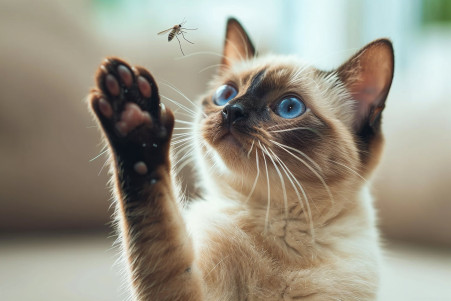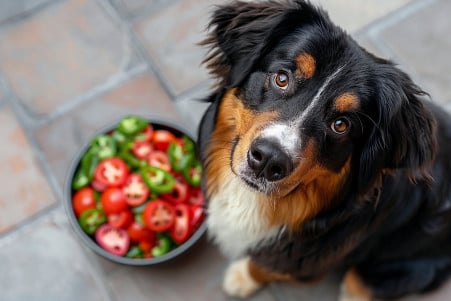Tagged With Health Alerts

Can Dogs Have Balsamic Vinegar? A Closer Look
4 June 2024
Balsamic vinegar is another type of vinegar that is not safe for dogs because it contains grapes and raisins, which are known to cause kidney failure in dogs.

How to Know If Your Cat Still Has Kittens Inside After Birth: Key Signs and Tips
3 June 2024
Symptoms that your cat has retained kittens after birth, such as ongoing labor signs, straining without giving birth, and enlarged mammary glands. Contact your vet if the symptoms don't go away.

Can Dogs Have Cow Hooves? The Risks and Benefits
3 June 2024
Looking at whether cow hooves are safe for dogs, including their impact on dental health and the risk of choking.

Lyme Disease in Dogs: The Best Diet and Supplements for Recovery
2 June 2024
Nutritional guidelines for dogs that have Lyme disease, such as low-fat meats, foods that fight inflammation, and supplements that help with healing and lowering inflammation.

Can Dogs Eat Honeydew Melon? A Sweet Snack to Approach with Caution
1 June 2024
Honeydew is safe for dogs to eat every so often as long as it is given in moderation because it has some nutritional value and is low in calories.

Why Is My Dog Shaking and Panting? Causes and Concerns
31 May 2024
Causes of shaking and panting in dogs, such as stress, injury, heatstroke, and health issues that need to be addressed by a vet.

Can Dogs Eat Italian Sausage? Risks vs. Benefits Explored
31 May 2024
The dangers of giving dogs Italian sausage, such as high fat, salt, and harmful additives, and more nutritious meat and snack options.

Why Is My Dog Wheezing? Causes and Remedies Explained
31 May 2024
Causes, treatments, and prevention of dog wheezing, such as allergies, asthma, obesity, and airway obstructions that need to be treated by a vet.

Do Dogs Get Dizzy? A Look at Vertigo in Dogs
30 May 2024
Causes, symptoms, and treatments of dog dizziness and vertigo, such as vestibular disease, neurological problems, and how to help at home.

Do Mosquitoes Bite Cats? Understanding the Risks
29 May 2024
Cats can absolutely be bitten by mosquitoes, and the consequences can be dire, including heartworm disease. This is why it's so important to use repellents and other preventative measures to avoid bites.

Can Dogs Eat Red Peppers? Exploring the Pros and Cons
29 May 2024
Red bell peppers are a good source of vitamins and minerals for dogs, but they should be fed to dogs with care because of their spicy nature.

Can Dogs Eat Crayons? What You Need to Know
29 May 2024
Crayons present a low-level danger to dogs that have eaten them, such as stomach upset and the possibility of an intestinal blockage, which may need to be treated with medical intervention if they don't go away on their own.